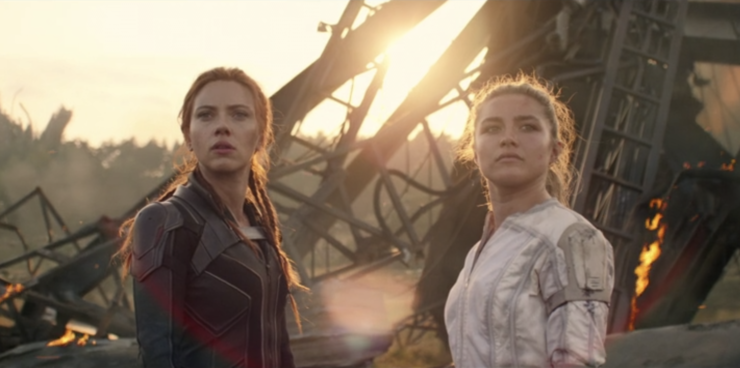From August 2017 – January 2020, Keith R.A. DeCandido took a weekly look at every live-action movie based on a superhero comic that had been made to date in The Great Superhero Movie Rewatch. He has been revisiting the feature every six months or so to look back at the new releases in the previous half-year. This week we kick off the latest revisiting with Black Widow, followed in the weeks to come by The Suicide Squad, Shang-Chi and the Legend of the Ten Rings, Venom: Let There Be Carnage and Eternals.
Marvel’s age of heroes started in 1961 with the introduction of the Fantastic Four, and in those early Cold War-era days, many of the villains the various Marvel heroes faced were Communists of some manner or other. Cold War sensibilities influenced the origin stories of the FF (beating the “Commies” into space), the Hulk (a “Commie” agent sabotaged the bomb test), and Iron Man (Stark was in Southeast Asia selling weapons being used to fight the “Commies”).
One of the many villains from behind the Iron Curtain introduced in those early days was the Black Widow.
Natasha Romanova, a.k.a. Natasha Romanoff, a.k.a. the Black Widow, started out as your classic femme fatale, a Mata-Hari-style seductress working for the Soviet Union and facing off against Iron Man in Tales of Suspense #52 by Stan Lee, Don Rico (writing as “N. Korok”), and Don Heck. Like many other Marvel villains—Quicksilver, the Scarlet Witch, Hawkeye, Mystique, the White Queen, Songbird, Sandman, Magneto, etc.—she switched to the good-guy side. Over the years she’s worked with S.H.I.E.L.D., the Champions, the Thunderbolts, and various Avengers teams, and also partnered with Daredevil (sharing billing on his title for a time), and worked alongside Captain America, Hawkeye, Wolverine, the Winter Soldier, and others at various points.
A second Black Widow was introduced in 1999, sent after Romanova in the Black Widow miniseres by Devin Grayson and J.G. Jones. Both this new Widow, Yelena Belova, and Romanova were trained in the Red Room, which was introduced in that same miniseries. Romanova and Belova have continued to appear in the comics, each using the Black Widow codename.
After appearing in Iron Man 2, Avengers, Captain America: The Winter Soldier, Avengers: Age of Ultron, Captain America: Civil War, and Avengers: Infinity War, Scarlett Johansson’s Marvel Cinematic Universe version of Natasha Romanoff had proven hugely popular, and yet she continued to not headline a movie. There was constant talk of a Black Widow film, but no forward movement on one. The rights to do such a movie had originally been purchased by Lionsgate in 2004, with David Hayter attached to write and direct, but reverted to Marvel Studios in 2006. Several directors were approached and considered, all women, and they ultimately went with Cate Shortland, whom Johansson had recommended based on her work on the 2012 film Lore. Two of the film’s three writers are MCU regulars: Jac Schaeffer, the show-runner for WandaVision and the forthcoming Agatha: House of Harkness, while Eric Pearson has worked on several of the shorts from the early MCU days, the Agent Carter TV series, and Thor: Ragnarok.
The movie was finally announced shortly before Avengers: Endgame was released. Romanoff’s idiotic death in that movie took the wind out of the sails of that announcement—whatever good will Marvel engendered by finally giving Widow a movie was drained away by the guarantee that there wouldn’t be a second film with Johansson in the role.
However, the film brings Belova, played by Florence Pugh, into the MCU, and there could easily be more Black Widow movies with her.
Buy the Book


Goliath
After hints of the Red Room, particularly in Age of Ultron, as well as an earlier 1940s version of the place seen in Agent Carter, this movie shows us the Red Room in action, and establishes that the Budapest mission first mentioned by Romanoff and Clint Barton in Avengers was the destruction of the Red Room.
Also starring in this movie are David Harbour as Alexei Shostakov, a.k.a. the Red Guardian, based on the comic-book character who was also Romanova’s husband, and Rachel Weisz as Melina Vostokoff, based on the comic-book character Iron Maiden, an enemy of Romanova’s. The pair are older Russian agents who pose as parents, with Natasha and Yelena as their daughters, in Ohio in the mid-1990s.
The movie takes place shortly after Civil War (although prior to the bit at the end when Captain America and the Widow break Sam Wilson and Wanda Maximoff out of the Raft), and William Hurt returns as Thaddeus Ross, taking place between his appearances in Civil War and Infinity War. Julia Louis-Dreyfuss returns from The Falcon and the Winter Soldier TV series in the post-credits scene as Contessa Valentina Allegra de Fontaine, for whom Belova is working in the present-day of the MCU. Jeremy Renner has an uncredited voice-only cameo as Hawkeye in a flashback scene to the Budapest mission.
Also introduced in this film are Olga Kurylenko as Taskmaster, a gender-flipped version of the comics character who can impersonate the fighting ability of anyone she observes; O-T Fagbenle as Rick Mason, a dealer who acquires things for Romanoff; Ray Winstone as Dreykov, the head of the Red Room; and Liani Samuel, Michelle Lee, Nanna Blondell, and Jade Xu as other Widows.
Xu’s next appearance is in Shang-Chi and the Legend of the Ten Rings. Pugh and Renner’s next appearances are in the Hawkeye TV series.
This movie was originally to be released in May 2020, but it was delayed by fourteen months because of the recent apocalypse.
“The best part of my life was fake”
Black Widow
Written by Jac Schaeffer and Ned Benson and Eric Pearson
Directed by Cate Shortland
Produced by Kevin Feige
Original release date: July 9, 2021
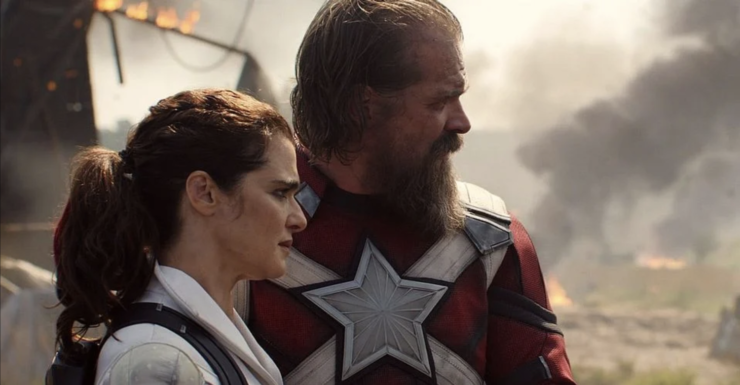
We open in Ohio in 1995, where Russian agents Alexei Shostakov (who has been given the super-soldier serum that was also given to Johann Schmidt, Steve Rogers, Bucky Barnes, Isaiah Bradley, the Flag Smashers, and John Walker) and Melina Vostokoff (trained in the Red Room as a Black Widow) are posing as suburban parents, with two little girls, Natasha Romanoff and Yelena Belova, as their daughters. The mission ends, and the quartet barely escape ahead of S.H.I.E.L.D. agents who have been sent after them.
Upon arriving in Cuba, they meet their handler, Dreykov, who has Romanoff and Belova sent to the Red Room.
Jump ahead twenty-one years, and Romanoff is on the run following the events of Civil War. Secretary Ross seems to be closing in on her, but it turns out she’s nowhere near where they thought. With the assistance of Rick Mason, she’s set up in an RV in the middle of nowhere in Norway.
Belova, meanwhile, is one of several Widows who have been brainwashed into working for the Red Room. One of the Widows, Oksana, has broken the conditioning, and is on the run. Several Widows, including Belova, are sent to stop her in Morocco. Her dying act is to spray red gas into Belova’s face, which breaks the programming. Oksana has a case filled with this antidote.
After sending the case to Romanoff, Belova goes to ground in a safehouse in Budapest. Mason brings Romanoff her mail, including the case. When the RV’s generator goes out, Romanoff drives into town, the mail all still in her SUV’s trunk. She’s attacked by the Taskmaster, but manages to get away (barely) with the antidote, which has inside it a picture of Romanoff and Belova as kids in Ohio.
She runs to Budapest, only to find Belova in her safehouse. They fight for a time, before finally agreeing to talk to each other. Belova sent her the antidote hoping that her Avenger friends could stop the Red Room. For her part, Romanoff had thought the Red Room destroyed. Her “job application” for S.H.I.E.L.D. was to assassinate Dreykov and wipe out the Red Room, an attack that also killed Dreykov’s daughter Antonia.
To Romanoff’s shock and dismay, she failed on all three levels: the Red Room is still active, and both Dreykov and Antonia are still alive. To Belova’s annoyance, the Avengers are kind of a mess following the events of Civil War, so they won’t be much help.
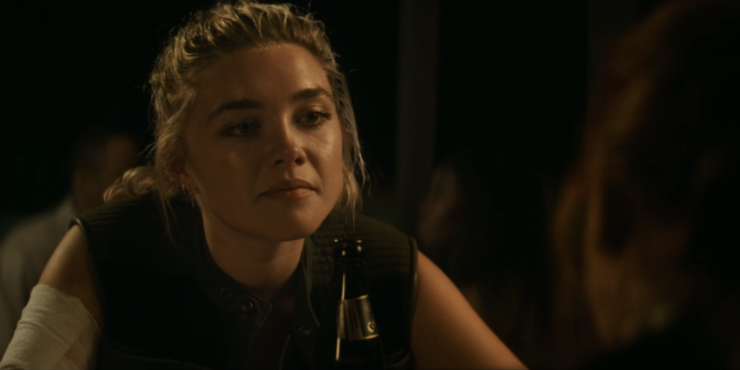
Several Widows and the Taskmaster attack the safehouse. After a merry chase through Budapest, Romanoff and Belova manage to escape. Mason provides them with a helicopter, and they proceed to Russia, specifically the gulag where Shostakov is imprisoned, as they assume he’ll know where the Red Room is.
Shostakov spends his time in prison gloating about his great battles, including several with Captain America. (Another prisoner points out that Captain America was frozen in the Arctic during Shostakov’s entire career as the Red Guardian, which doesn’t even slow Shostakov down.) After smuggling an earpiece in through a Red Guardian action figure, Romanoff and Belova give Shostakov instructions that he mostly follows. After a great deal of mayhem and battle, and an RPG-induced avalanche, they escape with him. Shostakov is surprised that they aren’t friendlier to him, and Romanov and Belova are surprised that Shostakov has no idea where Dreykov is hiding the Red Room. Dreykov is the one who put him in prison.
However, Vostokoff is still working with Dreykov, and they go to her farm. It’s a family reunion of sorts. Vostokoff shows off her work in manipulating the brains of pigs—she’s named one of them Alexei (“Don’t you see the resemblance?” she wryly asks an aghast Shostakov)—and then seems to betray them to Dreykov.
They’re brought to the Red Room’s headquarters, which is a big-ass helicarrier. Vostokoff is brought to Dreykov, Romanoff and Shostakov are imprisoned, and Belova is brought to be re-brainwashed. However, it turns out that Vostokoff and Romanoff have switched places, using S.H.I.E.L.D.’s face mask technology. Vostokoff frees Shostakov and Belova while Romanoff confronts Dreykov.
However, Dreykov emits a pheromone that keeps any Widow from harming him—Romanoff can’t attack him physically, no matter how much she wants to. However, Dreykov does reveal the extent of his influence, and also opens up the computer program through which he controls the Widows. She also annoys Dreykov to the point where he punches her repeatedly in the face. Once he reveals the computer, she smiles, thanks him, and—because he wasn’t strong enough to finish the job—smashes her nose into his desk, severing the nerve and keeping the pheromone from affecting her, at which point she beats the shit out of him. (Vostokoff warned her about the pheromone.)
The Widows all show up to stop her, while the Taskmaster—who, it turns out, is Dreykov’s daughter Antonia—fights Shostakov. Vostokoff is able to sabotage the helicarrier, and it crashes to the Earth, killing Dreykov, and Romanoff is able to release the antidote, freeing the Widows. She also downloads the info on Dreykov’s computer.
Once everyone gathers themselves following the crash, Romanoff—who sent word to Ross as to where she’d be—turns herself in to Ross to distract him while everyone else escapes. The Widows, including Belova, take the Taskmaster in, and they vow to find the remaining Widows around the world and free them.
Romanoff escapes from Ross pretty easily, dyes her hair blond, and then Mason provides her with a quinjet. She plans to use it to help Steve Rogers free her friends from the Raft.
Seven years later, following Romanoff’s death, we see Belova visiting her sister’s grave. Contessa Valentina Allegra de Fontaine shows up with her latest assignment: to assassinate Hawkeye, the one responsible for her sister’s death…
“I doubt that the god from space has to take an ibuprofen after a fight”
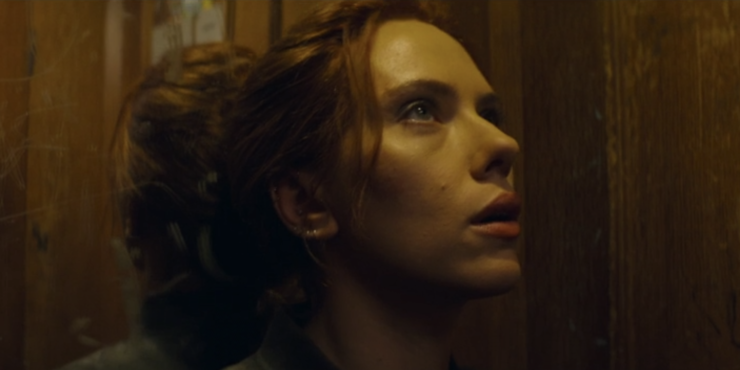
In many ways, this is the perfect Black Widow movie. Most of the MCU movies have been superheroic twists on existing movie subgenres, and the only way to go with the Widow would be to do a spy thriller, à la James Bond or Jason Bourne.
And we very much get that in Black Widow, from the globe-hopping to the car chase in Budapest to the multiple scenes of hand-to-hand combat to the fancy-ass gadgets to the ridiculous bad-guy headquarters. We get a Black Widow Greatest Hits, with her feigning helplessness to get information (Avengers), kicking ass during a car chase (Age of Ultron), disguising herself with a face mask (Winter Soldier), and coming up with clever strategies to solve problems (Endgame). Oh, and her mad computer skillz (Iron Man 2).
Plus, we get a full accounting of her background, after all the hints dropped in Avengers, Age of Ultron, and Winter Soldier.
The movie is tremendous fun, with the fast pace that you expect from a Marvel movie, but also with the strong, honest characterizations. Scarlett Johansson and Florence Pugh make a superlative double act, and their banter carries the movie. They talk like siblings, and Belova’s pointed commentary on Romanoff’s second life as a hero lands beautifully, as does Romanoff responding the same way she always does: not by talking about it, but by anteing up and kicking in and doing what’s right. The best, of course, is Belova teasing Romanoff about her “superhero landing” pose, which she’s used in pretty much every appearance going back to Iron Man 2, and it’s hilarious, particularly when Belova herself tries the pose. (“That was disgusting…”)
Both Pugh and David Harbour do a great job of stealing the movie from the title character. Pugh is a delight, and there really need to be more Black Widow movies with her in the lead. Harbour leaves no piece of scenery unchewed, and unlike his shouty over-the-top performance in the title role of 2019’s Hellboy, there’s a humanity behind it. Shostakov is a sad figure, and kind of a doofus, but he does care about his fake wife and fake daughters.
Unfortunately, Black Widow falls into the trap that too many MCU films have fallen into, and that’s forgetting to make the antagonist interesting. Ray Winstone joins the MCU Villain Hall of Shame alongside Mickey Rourke, Christopher Eccleston, Guy Pearce, Lee Pace, Corey Stoll, and Mads Mikkelsen, as his Dreykov is completely DOA as a bad guy. The Red Room as a concept is far scarier than its leader, and one wishes they had brought back Julie Delply from Romanoff’s flashback/hallucinations in Age of Ultron, and she might have been more effective—she could hardly have been less effective…
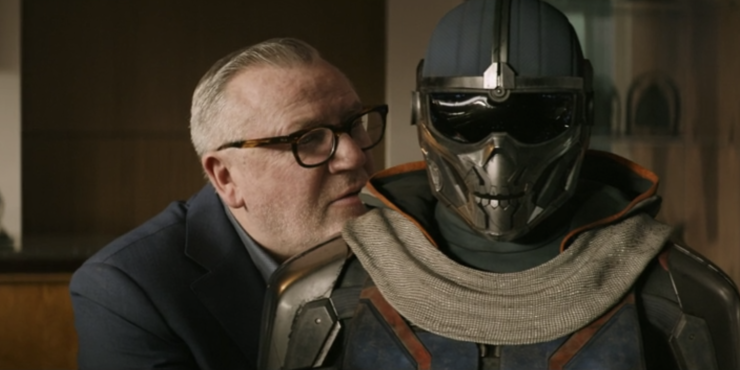
I must confess to a certain frustration in seeing that the only actual Russian actor in a movie filled with Russian characters is Olga Kurylenko—who has no dialogue! Instead, we have Harbour, Winstone, Pugh, and Rachel Weisz putting on comedy Russian accents, and it’s awful. Johansson just talks in her normal accent when she speaks English, which is fine—most people who learn a second language when they’re children don’t speak it with an accent, and I would rather Pugh and Weisz in particular just used their own voices instead of the fake accents. Or better yet, hire more Russian actors.
The movie has strong action, phenomenal pacing, a crackling script (so many great lines, even by Marvel’s high standards of great lines), and only slightly over-the-top action (mostly in the helicarrier-crashing climax). I would have liked a bit more time given to Dreykov’s commentary about how he recycles trash, using girls who have been chewed up and spit out by the world—while turning them into assassins isn’t great, it’s a better life for a lot of those girls…
Of course, it’s all a bit too little too late. Tony Stark, Steve Rogers, and Thor all had three movies each, while Peter Parker and Scott Lang had two each, all before they could be arsed to give one of the best MCU characters a spotlight she deserves (okay, fine, Iron Man, Cap, Thor, and Spidey are all iconic Marvel characters, but Scott fucking Lang??????), and they couldn’t do it until after the character was so wretchedly killed off.
And my hope for the post-credits scene was sadly dashed. I wanted it to be on Vormir, showing Romanoff at the bottom of the cavern, and Gamora showing up, reaching out her hand, and saying, “Let’s get out of here.” Alas.
Despite all this unfortunate and very heavy baggage, on its own as a Marvel movie, Black Widow is excellent. Even if it’s far far far later than it should’ve been.
Next week, we look at James Gunn’s reclamation project on The Suicide Squad.
Keith R.A. DeCandido is not, as far as he knows, a poser. He also, despite being a fourth-degree black belt, can’t do the superhero landing to save his life…










